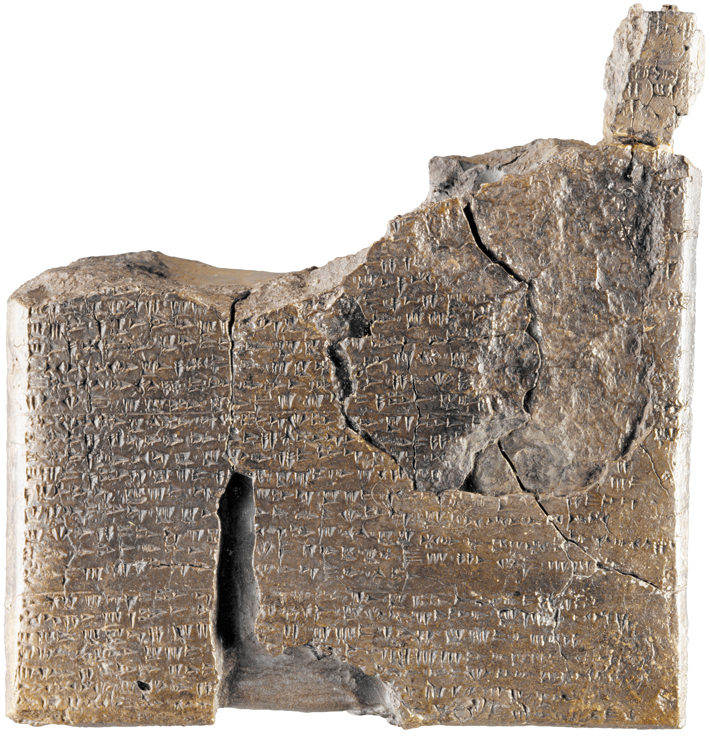A Poem for Ugarit
July/August 2021
 Of the thousands of texts from Ugarit, none shows the ancient Syrian city’s vibrant cosmopolitanism and civic spirit like the poem modern translators have called “Ritual of National Unity.” The text—fragments of which have been found inscribed in baked clay tablets using Ugarit’s own alphabetic script in six different parts of the city, suggesting it was widely known— includes specific references to nations that traded with Ugarit and whose citizens lived in the city. It decries slights against these foreigners and against the city’s most marginalized citizens.
Of the thousands of texts from Ugarit, none shows the ancient Syrian city’s vibrant cosmopolitanism and civic spirit like the poem modern translators have called “Ritual of National Unity.” The text—fragments of which have been found inscribed in baked clay tablets using Ugarit’s own alphabetic script in six different parts of the city, suggesting it was widely known— includes specific references to nations that traded with Ugarit and whose citizens lived in the city. It decries slights against these foreigners and against the city’s most marginalized citizens.
The poem begins with an appeal to the “rectitude of the son of Ugarit”—or daughter, in some versions. It then calls for “the well-being of the foreigner…be it according to the statement of the Hittite / Be it according to the statement of the Alashian.” Hittites and Alashians were Mediterranean peoples who traded with Ugarit and are known from other texts to have had migrant communities in the city. Similar shout-outs follow for other groups, some obscure today. The poem then pays homage to “your oppressed ones [and]… your impoverished ones,” and some versions call for “the well-being of the woman.” Scholars have interpreted those lines as an expression of consciousness of class and gender rarely documented so clearly in ancient texts. The poem also includes what appear to be stage directions. “Here is the donkey!” it says, perhaps a prompt for someone to lead a donkey into view. The work was obviously meant to be performed, says Philip Boyes of the University of Cambridge.
Evidence from other tablets found in the city points to suspicion of foreigners, and “Ritual of National Unity” might have been less a celebration of diversity than a reflection of a belief that mistreatment of foreigners and the poor could bring bad consequences. “It shows social consciousness,” says Andrew Burlingame, a professor of Hebrew at Wheaton College, but also a belief that “mistreatment of an individual or group of nonlocal origin could interfere with the favor of the city’s gods.”
Advertisement
IN THIS ISSUE
Digs & Discoveries
A Challenging World
The Spider's on the Wall
Mirror, Mirror
Return to Sender
The Copper Standard
Red Carpet Treatment
Buddhist Retreat
Tubman's Training Ground
Anchors Aweigh
In the Anatolian Arena
Lost Egyptian City
Laws of the Land
Bathing at the Bar
Off the Grid
Around the World
Ancient Australian multi-tools, Africa’s oldest house, Neanderthal hygiene, and Viking warrior bedding
Artifact
All wonders great and small
Advertisement

Recent Issues
-
 May/June 2024
May/June 2024
-
 March/April 2024
March/April 2024
-
 January/February 2024
January/February 2024
-
 November/December 2023
November/December 2023
-
 September/October 2023
September/October 2023
-
 July/August 2023
July/August 2023
-
 May/June 2023
May/June 2023
-
 March/April 2023
March/April 2023
-
 January/February 2023
January/February 2023
-
 November/December 2022
November/December 2022
-
 September/October 2022
September/October 2022
-
 July/August 2022
July/August 2022
-
 May/June 2022
May/June 2022
-
 March/April 2022
March/April 2022
-
 January/February 2022
January/February 2022
-
 November/December 2021
November/December 2021
-
 September/October 2021
September/October 2021
-
 July/August 2021
July/August 2021
-
 May/June 2021
May/June 2021
-
 March/April 2021
March/April 2021
-
 January/February 2021
January/February 2021
-
 November/December 2020
November/December 2020
-
 September/October 2020
September/October 2020
-
 July/August 2020
July/August 2020
-
 May/June 2020
May/June 2020
-
 March/April 2020
March/April 2020
-
 January/February 2020
January/February 2020
-
 November/December 2019
November/December 2019
-
 September/October 2019
September/October 2019
-
 July/August 2019
July/August 2019
-
 May/June 2019
May/June 2019
-
 March/April 2019
March/April 2019
-
 January/February 2019
January/February 2019
-
 November/December 2018
November/December 2018
-
 September/October 2018
September/October 2018
-
 July/August 2018
July/August 2018
-
 May/June 2018
May/June 2018
-
 March/April 2018
March/April 2018
-
 January/February 2018
January/February 2018
-
 November/December 2017
November/December 2017
-
 September/October 2017
September/October 2017
-
 July/August 2017
July/August 2017
-
 May/June 2017
May/June 2017
-
 March/April 2017
March/April 2017
-
 January/February 2017
January/February 2017
-
 November/December 2016
November/December 2016
-
 September/October 2016
September/October 2016
-
 July/August 2016
July/August 2016
-
 May/June 2016
May/June 2016
-
 March/April 2016
March/April 2016
-
 January/February 2016
January/February 2016
-
 November/December 2015
November/December 2015
-
 September/October 2015
September/October 2015
-
 July/August 2015
July/August 2015
-
 May/June 2015
May/June 2015
-
 March/April 2015
March/April 2015
-
 January/February 2015
January/February 2015
-
 November/December 2014
November/December 2014
-
 September/October 2014
September/October 2014
-
 July/August 2014
July/August 2014
-
 May/June 2014
May/June 2014
-
 March/April 2014
March/April 2014
-
 January/February 2014
January/February 2014
-
 November/December 2013
November/December 2013
-
 September/October 2013
September/October 2013
-
 July/August 2013
July/August 2013
-
 May/June 2013
May/June 2013
-
 March/April 2013
March/April 2013
-
 January/February 2013
January/February 2013
-
 November/December 2012
November/December 2012
-
 September/October 2012
September/October 2012
-
 July/August 2012
July/August 2012
-
 May/June 2012
May/June 2012
-
 March/April 2012
March/April 2012
-
 January/February 2012
January/February 2012
-
 November/December 2011
November/December 2011
-
 September/October 2011
September/October 2011
-
 July/August 2011
July/August 2011
-
 May/June 2011
May/June 2011
-
 March/April 2011
March/April 2011
-
 January/February 2011
January/February 2011
Advertisement





